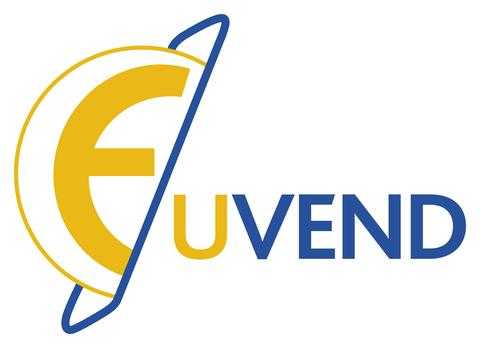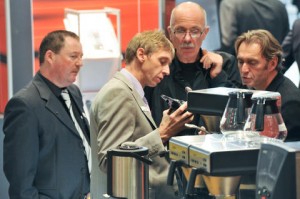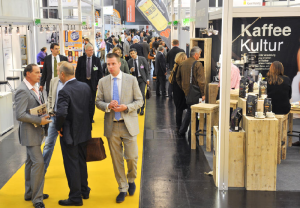COLOGNE – Vending machine operators can boost turnover by up to 15 per cent if they make effective use of telemetric systems. In the vending sector, telemetry involves the transmission of data between vending machines and their operators in real time.
This function now also encompasses cashless payment by means of credit cards or mobile phones, as well as app merchandising features that alert users to special campaigns and happy hour click & buy offers. The findings of recent years show that all of these measures promote customer loyalty and help boost profitability.
This development benefits vending machine operators and installers as well as consumers, since information about product inventory, pricing and the servicing of the machines can be very easily transmitted through virtual channels.
Visitors will discover new ideas and information about the sector’s future outlook at Eu’Vend & coffeena – International Vending and Coffee Fair, which will be held in Cologne from 19th to 21st September 2013.
For around five years now, the vending sector has been investing in the further development of telemetric systems that are used in beverage, snack and merchandise vending machines in order to provide users and operators with a wide range of benefits.
In addition to allowing vending machines to be remotely accessed, such networked systems can enter data and eliminate faults and errors electronically. Should maintenance staff nevertheless have to repair a damaged vending machine on site, a remote diagnosis can provide important advance information regarding the spare parts that have to be brought along. Doing so cuts support costs by up to 20 per cent and enhances the supplier’s service-focused culture.
The telemetry systems enable the vending machines to transmit the required information to the operator via a dial-up connection. This helps to avoid supply bottlenecks and ensures that service assignments (water filter replacement, customer service etc.) are scheduled in good time.
The latest generation of telemetry technology even allows customers to increase the ingredients of hot beverages or change their recipes. In addition, the systems permit operators to centrally manage and program promotional price changes or test the acceptance of new products.
Studies conducted over a period of three months have shown that product range optimisation can increase turnover by five per cent, while promotional activities at the point of sale can boost turnover by three per cent.
What’s more, regularly scheduled price changes for the sale of product combinations during a happy hour can raise turnover by 19 per cent.
To enable interactive shopping, vending machines can feature touchscreens like those on smartphones, as well as easy-pick displays that allow consumers to obtain information about products, buy items, take part in prize competitions and make cashless payments.
This is a groundbreaking example that makes the vending sector one of the most modern forms of retail for food and non-food products.
In line with this development, the automatic systems and concepts are being supplemented by near field communication (NFC) technology this year.
This technology enables short-distance data transmission between mobile phones or NFC chip debit/credit cards, on the one hand, and checkout terminals, on the other, so that customers can make non-contact payments within seconds. It can also help to boost customer loyalty by means of vouchers and reward programmes, for example, or by services such as event tickets, travel tickets and access codes.
Examples of this technology will be displayed at Eu’Vend & coffeena in Cologne.
Following the successful launch in Poland of Telekom Mobile Payment’ myWallet in 2012, Deutsche Telekom will also introduce this mobile wallet feature to Germany this year.
More than 5,000 customers have signed up for this NFC payment service in Poland since the end of October. The service, which is also available for smartphones as an app, combines a variety of non-contact payment methods. In addition, it enables users to collect flight tickets, bonus tickets and other features in one place.
Deutsche Telekom plans to launch the service in five additional countries this year. Among them will be Germany, where myWallet will be introduced in the second quarter.
Deutsche Telekom will exhibit its innovative myWallet system at this year’s Eu’Vend & coffeena. myWallet competes with girogo, a non-contact card offered by Germany’s savings banks and credit unions, and with the mobile phone payment system mpass, in which
Deutsche Telekom is involved as well. In addition, Deutsche Telekom and Mastercard will introduce an NFC chip-equipped payment card on the market. The NFC chip will later be incorporated into the SIM card so that users will no longer be dependent on NFC-enabled devices.
girogo, on the other hand, is solely associated with NFC technology. This results in numerous benefits for the vending segment. girogo, a successor of traditional debit cards, allows customers to pay for small amounts under ¤20 in less than one second and without having to enter a PIN or write a signature. Up to 200 can be loaded onto the radio frequency chip card.
girogo was officially launched in April 2012, when it was initially used in a pilot project in Hanover, Braunschweig, Wolfsburg, Hanau, Leverkusen, Krefeld and Erfurt. By 2015 all of the 45 million SparkassenCards will be equipped with the new payment feature.
In May 2013 a new generation of high-tech vending machines was upgraded for girogo in a test region. The project will initially encompass about 50 coffee, snack and cigarette vending machines at train stations in the Hanover, Braunschweig and Wolfsburg regions.
By the end of the year, 150 additional vending machines will be added to the new system in Hamburg, Frankfurt, Munich and the Rhineland. Esso also plans to equip all of its 1,100 filling stations in Germany for the non-contact payment function by the end of this year.
The Microtronic, M.E.I. and Crane Payment Systems companies are also intensely researching NFC technology. They will present in-depth information about their innovations and services at Eu’Vend & coffeena.
Source: Eu’Vend & coffeena – press release

















